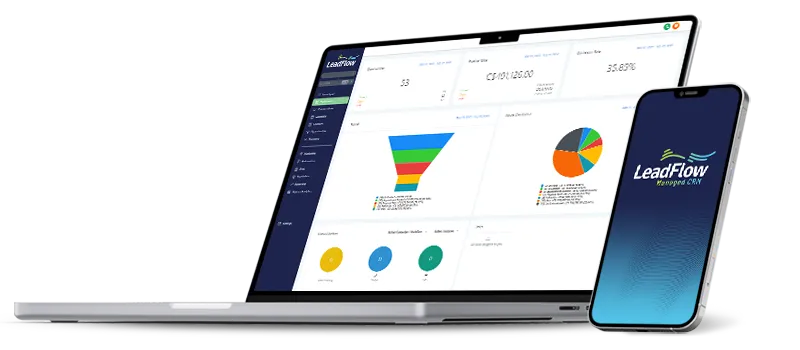Blog

How to Choose the Right CRM for Your Business
Selecting the right Customer Relationship Management (CRM) system can transform how you keep track of your clients, drive sales, and scale your operations. With an endless list of CRM options available, you might struggle to identify which solution fits your unique needs and budget.
The challenge isn't just finding a CRM with the right features; it's finding one that actually works with your business operations on a day-to-day basis.
Understanding Your Business Requirements First
Before you start sifting through CRM features, assess your current processes and identify any pain points. Take a close look at how you currently track leads, manage customer communications, and measure sales performance. This baseline assessment reveals gaps that a CRM system needs to address
Key Questions You Should Ask:
How many leads does my business generate monthly?
Where do these leads come from?
What's my current follow-up process?
How long does it typically take us to close a deal?
What causes our leads to fall through the cracks?
Your needs as a small business differ from those of larger enterprises. If you're a startup, you might prioritize lead capturing and basic pipeline management, while an established company may require advanced automation and detailed analytics. Understanding your specific needs prevents you from paying for unnecessary features or choosing systems that lack essential functionality.
Key Features That Matter Most
Lead Management and Pipeline Tracking
The foundation of any effective CRM lies in its ability to capture, organize, and track your leads through the sales process. You should look for systems that automatically capture leads from multiple sources and provide clear visibility into your pipeline progression.
Without proper lead tracking, you lose sight of potential customers and miss opportunities to nurture relationships at critical moments.
Capturing a new lead or inquiry
Tracking your ongoing conversations
Following up and closing the deal
Communication Centralization
Your business likely communicates across multiple channels, including email, phone, social media, and messaging apps. The right CRM consolidates these interactions into a single, accessible record for each customer. This prevents important communications from falling through the cracks and ensures your team members stay informed about customer history.
Questions piled up. “How do I migrate existing contacts? Which features actually matter? How do I keep my team on the same page?” With little onboarding help available and support tickets going unanswered, the rollout stalled.
What changed everything was having access to real, hands-on support through Easyleads. Once they had someone to guide them through those early steps by answering questions, troubleshooting, and sharing best practices, the CRM finally integrated into their workflow. Instead of giving up or working around problems, they felt confident using the system day-to-day.
Automation Capabilities
Manual data entry and repetitive tasks drain your productivity and create opportunities for error. Effective CRM systems automate routine processes like lead scoring, follow-up scheduling, and data updates. This automation allows your sales team to focus on relationship building rather than administrative tasks.
Common Automation Features You Need:
Automatic lead capturing from your website and forms
Scheduled follow-up reminders
Email sequences for lead nurturing
Pipeline stage updates
Task assignments based on lead behaviour
Integration Requirements
You probably use multiple software tools for different functions. Your chosen CRM should integrate seamlessly with your existing systems, like email platforms, accounting software, and marketing tools. Poor integration creates data silos, forcing your team to work across disconnected systems.
Implementation and Support Considerations
Onboarding Process
The complexity of implementing a CRM varies a lot between providers. Some systems require extensive technical setup and training, while others offer guided onboarding with personal support (like Easyleads). When making your decision, consider your technical capabilities and available time for implementation.
Ongoing Support Quality
Your CRM system will require ongoing support for troubleshooting, feature updates, and questions from your team. Some providers offer comprehensive support with dedicated account managers, while others rely on self-service resources or charge additional fees for assistance. The quality of support directly impacts whether you’ll actually adopt the tool and use it effectively.
Support Red Flags You Should Avoid:
Support is only available through forums or chatbots
Long response times for technical issues
Additional charges for basic assistance
Limited training resources or documentation
Making Your Final Decision
Start with Your Core Needs
Rather than choosing systems based on extensive feature lists, prioritize solutions that excel at what you actually need. A CRM that handles your lead management and communication effectively often provides more value than one with numerous features you won't use.
Focus on your basics first:
Lead capturing and organization
Communication tracking
Follow-up management
Basic reporting and analytics
Consider Your Growth Potential
Your business needs will evolve as you grow. Your chosen CRM should accommodate increased users, higher data volumes, and expanded functionality without requiring a complete system overhaul. Scalable solutions protect all the time and money you’ve put into training, data migration, and process development.
Evaluate Total Value
Your right CRM choice balances functionality, cost, and support quality. The least expensive option may cost you more in the long run if it lacks essential features or requires expensive add-ons. Similarly, feature-rich systems provide poor value if you won't use most capabilities.
Your Value Assessment Framework:
Calculate your total monthly costs, including all fees
Estimate time savings from automation features
Consider the revenue impact from improved lead management
Factor in support quality and onboarding assistance
Your Path Forward
Choosing the right CRM requires careful evaluation of your business needs, feature requirements, and total costs. When you invest time in this decision process before you hop feet first into the biggest CRM out there, you typically achieve better results, and your team is more likely to actually use the tool.
The most successful CRM implementations start with clear goals, involve your key team members in the selection process, and prioritize solutions that offer strong support during onboarding and beyond. By focusing on your core requirements rather than the quantity of features, you can identify CRM systems that support your growth objectives.
But here's the reality: you're not trying to become a CRM expert. You just want something that works, doesn't cost a fortune, and helps you stay organized without adding more work to your plate.
Want to see what a CRM can do when it's actually set up to help your business grow? book a quick discovery call and we’ll walk you through Easyleads with no pressure and no tech headaches. We'll show you exactly how the right CRM partner makes all the difference for your business.

Copyright Easyleads CRM 2023 - Privacy Policy - All Rights Reserved

